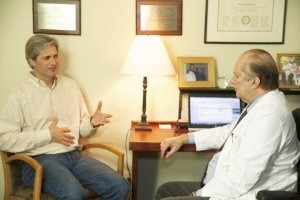 This post first appeared online as a response to Becker’s ASC Review’s “Ask a Gastroenterologist” Series on June 20, 2014.
This post first appeared online as a response to Becker’s ASC Review’s “Ask a Gastroenterologist” Series on June 20, 2014.
Almost a decade ago, I became concerned with emerging difficulties in health care, due to an increasing financial burden from growing drug costs, increasing emphasis on ordering expensive and at the time unneeded procedures that are highly reimbursed and increased pressures to see more patients in less time. This hit me hard because I have always valued the sanctity of the patient provider relationship and the positive effects on outcome of patient centered care. (See Medicine has become a business, but what is the cost? Drossman DA. Gastroenterology. 2004 Apr;126(4):952-3.)
Perhaps out of some fiscal necessity these days, medicine has become a business. As such recently our field has led to a loss in training of the values and skills necessary to enhance patient-doctor communication, and in an erosion of financial support for clinical educators to teach these skills. Most clinicians are not sufficiently trained in patient centered biopsychosocial care, as recommended over a decade ago by the Institute of Medicine. They are not skilled in active listening, making good clinical observation and judgments to effectively diagnose and subsequently work with patients in plans of care that lead to better outcomes. Instead many clinicians approach human illness from a dualistic (i.e., organic vs. functional) perspective, order studies to “rule out organic disease,” or to reduce malpractice suits in a litigious society–even though malpractice suits relate more to poor patient-doctor communication and lack of caring, than to not doing the right tests.
To me, the most fascinating part of clinical care—and also one of the most challenging– is to understand the complex mind-body aspects of GI illness, particularly the functional GI disorders (FGIDs), and to help in the management of patients so affected. And there are growing challenges to accomplishing this: poor reimbursement for spending the time needed to understand these disorders and establish the necessary relationship-centered care, helping patients ignore dualistic biomedical dogma that lead to stigmatization, helping patients understand their conditions as “real” and manageable, yet having to spend more patient time facing the computer to maintain record documentation, and helping to educate the referring physicians in ways to successfully continue in their patient care.
But in the current healthcare environment this challenge is made even more difficult with the harsh reality that physicians and patients already know too well: that doctor-patient relationships are continuing to suffer due to time constraints. And this harsh reality isn’t getting any better as doctors in training are spending less time with patients than ever before, according to a recent study.
Perhaps the greatest problems that emerge with continually decreasing amounts of time that clinicians can spend with patients include the inability to: 1) obtain sufficient high quality information about the illness and 2) have quality time to establish an effective patient-provider relationship. This can result in inaccurate diagnoses and treatments as well as patient and physician dissatisfaction with each other and the very process of care.
So it’s no surprise that one of the greatest challenges facing gastroenterologists, especially those in training, is learning the basics of good communication skills in their work with patients so that a higher quality of information is obtained and is done in a fashion that builds and strengthens the relationship and as we are now learning improves not only patient satisfaction but adherence to treatments and improving even hard clinical outcomes. It’s not what you do (in the amount of time available) but how you do it that makes the difference.
However, this challenge is also an exciting one because it pushes clinicians to seek and develop creative ways to communicate with their patients in order to improve not only their relationships but the quality of care that they deliver. I see some interesting efforts to improve physician efficiency using scribes, health care extenders and the like, but improving efficiency doesn’t always mean improvement in clinical skill. That is the greater challenge.
Douglas A. Drossman, MD
 5826 Fayetteville Rd., Suite 201 Durham, NC 27713
5826 Fayetteville Rd., Suite 201 Durham, NC 27713  (919) 246-5611
(919) 246-5611 